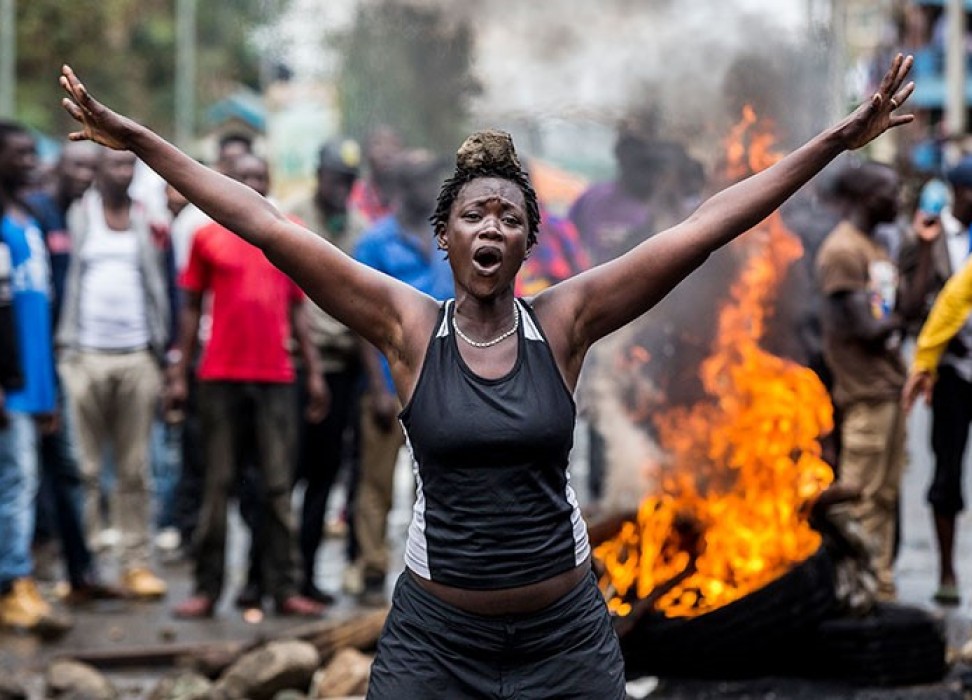
Justice was never really on the table during this month’s presidential elections in Kenya. For much – probably most – of the political class, the crimes against humanity committed in the wake of the 2007/08 post-election violence were a thing of the past. Previous promises that justice would be pursued turned out to be empty. Neither of the two top presidential candidates – William Ruto and Raila Odinga – put any meaningful emphasis on the need for accountability or the plight of those whose loved ones were murdered and families displaced. The International Criminal Court (ICC), which had investigated the alleged atrocities in the country, failed to make any headway, with only one trial – relating to the obstruction of justice – still proceeding. Is it time to announce the death knell for justice in Kenya?
A brief reminder: in the wake of the 2007/08 presidential elections, violence erupted along ethnic – and political – lines. The result was that some 1,500 people were killed and over half a million Kenyans displaced. A Truth Commission was convened and, with Kenyan authorities dragging their feet and unwilling to proceed with cases of their own, the ICC opened an investigation.
The Court eventually issued a number of arrest warrants, including for two senior politicians: Uhuru Kenyatta and William Ruto. Fearing prosecution, the two erstwhile enemies allied together under the Jubilee Alliance. In 2013, they became president and deputy president, respectively, and governed the country until earlier this month. Meanwhile, their cases at the ICC collapsed, amidst allegations of witness interference and murder, as well as weak investigations on the part of the Court.
Over this period, Kenya’s government and its allies focused on two claims. The first was that the ICC was an illegitimate court and ‘plaything’ of colonial powers. To this end, Kenyatta’s government hired British public relations experts to spread its word and undermine the standing of the Court.
Kenyatta and Ruto’s second claim was that Kenya was able and willing to investigate any alleged wrongdoing itself. Senior officials, including the Attorney General Githu Muigai, repeatedly stated that Nairobi would set up an International and Organized Crimes Division as part of its judiciary capable of investigating and prosecuting any perpetrators of atrocities. It never happened. What did transpire, however, was that Kenyatta and Ruto stayed in and consolidated their power, as much of the world slowly forgot about the 2007/08 atrocities.
By their second term, however, Ruto and Kenyatta had a falling out. Perhaps their alliance of convenience, hastily put together to establish a united front against the ICC, had lost its relevance.
In this past election, outgoing President Kenyatta endorsed not his deputy but long-time opposition figure Raila Odinga. In the end, at least according to half of the country’s electoral commission, Ruto defeated Odinga. He will thus become Kenya’s next President unless Odinga’s petition challenging Ruto’s win before the Supreme Court is successful. Rather remarkably, this means that the country’s last two heads of state will have been implicated in atrocities and tried, unsuccessfully, at the ICC.
Where does that leave justice and accountability efforts in Kenya?
Exactly as they were. There is no reason to believe that a Ruto government will show any interest in revisiting, let alone doing something, about the rights violations committed in 2007/08.
We in the international justice community are fond of telling ourselves and those who will listen that ‘it is only time before justice catches up with perpetrators.’ We tell stories of how so-and-so was on the run but eventually caught and prosecuted, and that therefore those who are still out on the lamb better think twice. We tend to neglect or minimize those cases that don’t end well or identify external reasons to attribute their failure. Again, we say that accountability is a long shadow that will eventually catch up with whichever fugitive we are talking about – Russia’s Vladimir Putin, Sudan Omar al-Bashir, or North Korea’s Kim Jung-Un.
In some cases, we’re not wrong. Sometimes justice does catch up with perpetrators. But often it doesn’t. Members of the George W. Bush administration live openly and freely, despite starting and running Guantanamo Bay and facing long-standing calls to hold him to account for war crimes in Iraq, including by the New York Times. There appears to be little-to-no momentum to hold China’s leadership to account for alleged genocide in Xianjing. Rwanda’s Paul Kagame remains a darling of the west – and someone to ship refugees to – despite ongoing and long-standing allegations of involvement in human rights violations as well as the murder and abduction of dissidents.
What is needed is a greater degree of honesty. Being honest can help to not only set reasonable expectations but also encourage those in the best position to push for justice to do so, without the false hope that it will inevitably or eventually happen, just because an international tribunal has said it should.
One of the most important yet neglected lessons of the world’s experiment with international criminal law is that it is not the ICC, the United Nations or any international body which is most responsible for those rare moments when justice and accountability is delivered; it is changes in the domestic political arena. When investigating and prosecuting atrocities becomes important to the national leaders in charge, it becomes possible.
The context in Kenya has never been ripe for justice and accountability. Not once since 2007/08 has there been a serious attempt to address the widespread and systematic crimes that were committed following the presidential election. There has been a lot of talk and a many empty promises.
If ever accountability is to be pursued, it won’t be because of the ICC or any international institution, but because the Kenyan people want it and because leaders not implicated in violence, atrocity, and corruption can successfully run for office.

